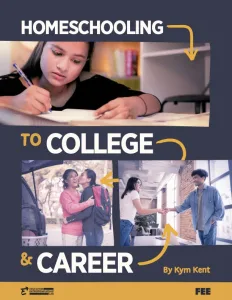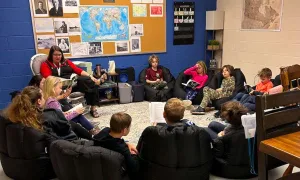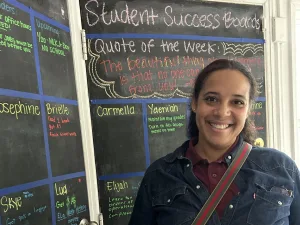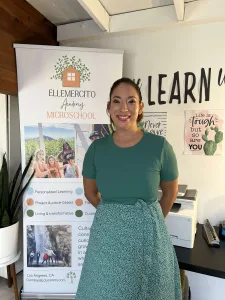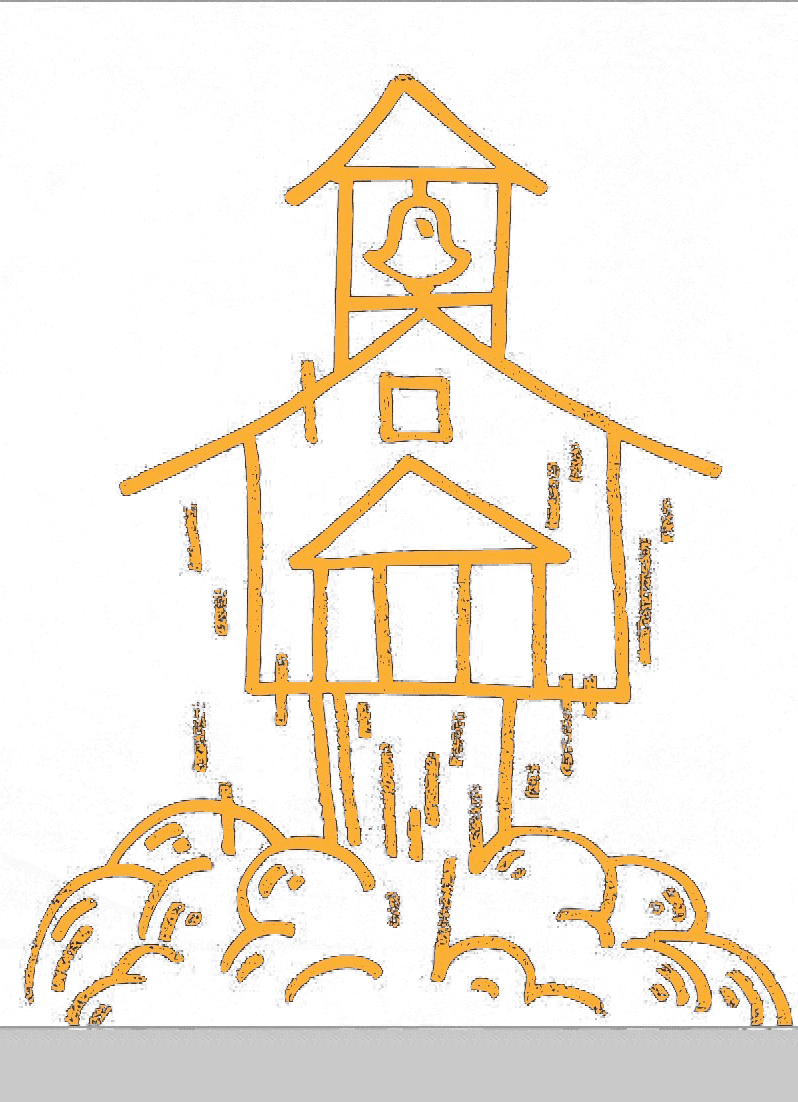One of the first questions new homeschoolers often ask is “Which curriculum is the best?” The answer to this question is very similar to the Cheshire Cat’s reply to Alice: “That depends a good deal on where you want to get to.”
When I set out to homeschool seven years ago, I assumed my job was to mimic public school at home. It had never occurred to me that our school system—including its list of core subjects, its pacing, and its emphasis on certain skills over others—is based on just one of many educational philosophies. Further, I had never considered that there might be philosophies that better align with my personal values.
When parents are empowered to choose learning environments that align with their educational philosophy, joining a learning community becomes a great boon to the whole family.
An educational philosophy aims to answer the following questions:
- What is the purpose of education?
- What does learning look like, and how is it assessed?
- What is the role of the teacher?
- What is the role of the student?
Whether you plan to homeschool, or you are looking for an alternative education environment like a microschool, you will benefit from learning about different educational philosophies, and discovering which best aligns with your personal goals and desires for your child’s education.
It’s important to note that no educational system will ever teach your children everything they could ever need to know. Public school does not, your homeschool will not, and a microschool will not. However, school choice empowers you to choose which things will be emphasized and which will not. Consider the following educational philosophies to see what resonates with you:
Montessori
Montessori offers a carefully prepared environment designed to foster independent learning through curiosity, interest and some structured lessons.
- Educational Goals: Montessori education is focused on the development of skills necessary for a productive and fulfilling life, prioritizing inner discipline, integrity, and respect for others and oneself.
- Teacher Role: Guides students through an uninterrupted work cycle, presenting materials for interest-led learning, and facilitating group gatherings; Models respect and encourages independence
- Learner Role: Based on the core belief that children are naturally curious and capable of learning independently, children choose from a variety of hands-on materials based on their interests.
Waldorf (Steiner)
Waldorf is a K-12 pedagogy with developmentally appropriate, creative, experiential, and academically rigorous activities.
- Educational Goals: Waldorf education, and what are known as Steiner schools, nurture children’s potential as curious, capable, and competent individuals who can actively construct their own knowledge.
- Teacher Role: Presents core academic lessons through storytelling and experiential and artistic activities; Enlivens the physical, emotional, intellectual, social, artistic, and spiritual capacities of the learner; Traditionally stays with a class for several years to foster connection through the phases of development
- Learner Role: Children are encouraged to be active participants in learning by participating in class discussions, hands-on activities, creative expression, and nature exploration.
Reggio Emilia
This is a child-centered, inquiry-led learning model, typically used for early childhood education but principles can be adapted to upper grades.
- Educational Goals: Reggio Emilia fosters the development of a child’s inherent capabilities to be curious and learn.
- Teacher Role: Acts as a guide, researcher, and co-learner rather than lecturer; Observes, poses questions, and provides resources to support exploration
- Learner Role: Children co-create their learning experience through curiosity, exploration of surroundings, and expressing their learning through their native “100 languages,” including movement, art, conversation, music, etc.
Classical
Learning is structured into three stages—grammar, logic, and rhetoric—with a focus on reading the great books of Western civilization and developing critical thinking and effective communication skills as well as a lifelong love of learning.
- Educational Goals: Classical education emphasizes character development, including a love for truth, goodness, and beauty, through the study and discussion of rich literature, a deep understanding of core subjects, making connections to history and culture, and learning how to learn and think for oneself.
- Teacher Role: Instills a love of learning by being a subject matter expert and a passionate learner; Models virtues in their own lives; Leads the classroom by a creating positive learning environments; Fosters critical thinking through Socratic discussion and acts as a guide by encouraging students to extend their learning through interest and curiosity
- Learner Role: Learners work through the stages of development by memorizing foundational knowledge (grammar stage, ages 5-10), analyzing (logic, ages 10-14), and then synthesizing and communicating their learning (rhetoric, ages 14-18).
Charlotte Mason
This approach uses short, rich lessons using “living books” (as opposed to textbooks), nature study, and habit training.
- Educational Goals: Charlotte Mason education promotes a joyful learning experience through natural curiosity, exploring rich ideas and concepts, and developing habits of self-education and moral character to become thoughtful, responsible, and engaged members of society.
- Teacher Role: Presents ideas and important life lessons through quality books and literature and nature study; Follows the natural curiosity and pacing of the child; Encourages thinking by asking questions and reinforces habits for responsible adult life
- Learner Role: Learners are viewed as full people with their own will and capacity for learning, rather than an empty vessel to be filled. Learners are encouraged to engage with the material presented, internalize and present their knowledge, and make it their own.
Self-Directed Learning/Unschooling
Children follow their interests and learn through whatever means aligns with their needs, values, and goals, including curriculum support, hands-on learning, internet research, books, apprenticeships, videos, online learning tools, classes, travel, etc. Life is the lab for learning and anyone can be a teacher along the way. Self-directed learning and unschooling can be done anywhere, but there are spaces designed to foster it including Agile Learning Centers and Sudbury schools modeled after the Sudbury Valley School.
- Educational Goals: Self-directed learning and unschooling create lifelong learners by giving children space to follow their intrinsic curiosity and motivation. Learners engage fully in life by seeing the world as their classroom, and discover their unique gifts and talents through exploring their interests on their terms.
- Teacher Role: Offers opportunities, facilitates interests, and models habits of lifelong learning and personal responsibility; Connects with the child over their interests, helping to foster new discoveries and deepening learning
- Learner Role: Learners play, follow their curiosity, ask questions, find ways of learning that work for them, and set and achieve goals based on personal values and interests.
Project-Based Learning (PBL)
Project-based learning exists along a spectrum, from fully teacher-led projects like a unit study to fully learner-led projects where the entire project is the idea and creation of the learner, usually assisted by the teacher or guide.
- Educational Goals: The main goal is to increase student engagement and thus, student learning and retention, through real-world, meaningful, and often interest-led application. Projects tend to foster creativity, problem-solving, and collaboration more than traditional lecture.
- Teacher Role: In the case of unit study, the teacher selects the project, provides the supplies, and instructs the process. However, in its most student-led form, the project is designed entirely by the student, and the teacher acts as facilitator and mentor, offering opportunities to reflect, encouraging problem-solving, and presenting resources. In more traditional environments, the teacher also seeks to align projects with curriculum standards.
- Learner Role: Learners work on extended projects based on personal interests, subject matter, or teacher-led inquiry. Project-based learning often includes reflecting on the project at its end to communicate learning and growth through conversation, writing, or some other portfolio record.
Progressive/Constructivist
This is a learner-centered philosophy focused on practical life experiences and social interactions in which learning is an active and constructive process, including experimenting and doing rather than merely being lectured at.
- Educational Goals: Prepare children to thrive in a constantly changing world with the skills and mindset for lifelong learning and collaboration.
- Teacher Role: Creates a miniature democratic society in the classroom where students learn to collaborate, solve problems, and make decisions; Encourages exploration, discovery, and critical thinking through hands-on, “learn by doing” activities and reflection.
- Learner Role: Learners explore their environment and the learning tools provided, ask questions, engage with peers and the teacher in collaboration, problem-solving, and decision-making.
Forest & Farm Schools
As our world becomes increasingly digitized, some educators are creating environments to increase engagement with nature and active play. These include forest schools, farm schools, and location-independent outdoor or traveling schools.
- Educational Goals: Cultivate confidence by teaching real-world, place-based skills; Increase resilience by doing hands-on work and coping with natural elements such as weather changes; Foster whole-child development through opportunities to create, problem-solve, measure risk, and engage with the wider world
- Teacher Role: Supports risk-taking and inquiry, creates an outdoor environment where kids have the freedom to explore and try their own ideas; Provides real work opportunities to care for the environment, building and working together in community
- Learner Role: Learners explore, build, and investigate the world around them, and participate in group activities as led by instructors, contributing ideas and effort to community work.
Traditional/Essentialism
This philosophy focuses on a standard set of core knowledge and skills that are considered “essential” for success in the greater world.
- Educational Goals: Prepare learners for the workplace by teaching the foundational knowledge and skills required for college or vocational school entrance. This includes academics in core subjects including language arts, math, science, and history as well as reinforcing traditionally held values including honesty, respect for authority, and work ethic.
- Teacher Role: In traditional classrooms, the teacher is the authority figure and expert in subject matter. Teachers generally present material through lectures, reinforce through practice, and assess learning through written tests and graded assignments.
- Learner Role: Learners are expected to listen to lectures, complete practice assignments, and study as needed to prove learning (or memorization) through tests.
Competency-Based/Mastery-Based Learning
This educational approach emphasizes core knowledge such as traditional school subjects. The difference from many traditional classrooms is the individualized pacing which prioritizes mastery over rote memorization or superficial coverage of material. Many current digital learning tools and curriculum, such as Khan Academy, promote mastery-based learning.
- Educational Goals: Thorough understanding of content and mastery of skills in a set of academic subjects
- Teacher Role: Presents material and subject matter; Provides individualized ways to practice, and assesses for mastery before offering new content; Gives opportunities to redo assignments or practice in other ways until mastery is reached
- Learner Role: Learners set and follow their own pace in completing assigned subject matter, and give evidence of mastery through assignments, tests, and projects.
While not necessarily scientific, you may find it helpful to take a personality quiz like this one. Like most personality traits, educational philosophies are a spectrum. We have things that we lean more heavily toward, but we generally see value in all of them. Humans are truly eclectic and dynamic—another reason we need a variety of learning options available! When you know what you value most, you can find the curriculum or learning environment that best supports your goals and the needs of your learners.

